Homily for Men’s Ministry Mass, Monday 6th Week in Ordinary Time, Year 1
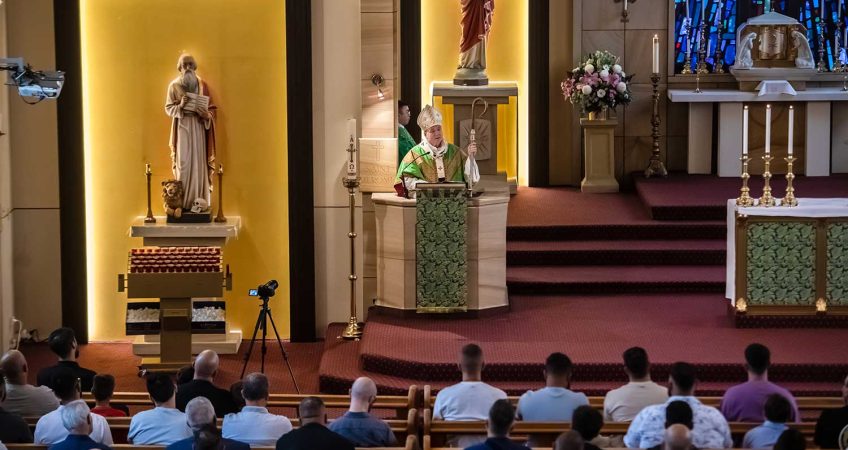
St. Jerome’s Church, Punchbowl, 13 February 2023
Übermensch was the name given by the 19th-century philosopher Friedrich Nietzsche (1844-1900) to those who were above and beyond the ordinary run of human beings.[1] Sometimes the term is translated ‘Superman’, like the comic, TV and movie hero, but that’s not what Nietzsche meant. For him, the übermensch was no sci-fi being with otherworldly powers, but a concrete call to each person to rise up bravely and determine for themselves what it means to live life to the fullest.
Nietzsche thought that all that stands in the way of our becoming übermenschen are the traditions and value-systems that control us, stifling our autonomy, individuality and creativity. Christianity was the one he most detested. He was scandalised at the thought of a god who suffers and dies, by a faith that prioritises the weak, and by a morality that encourages compassion, forgiveness and works of mercy. He called this the ‘slave morality’ of the üntermenschen, the less-than-humans.
If Nietzsche was the most famous champion of breaking free from spiritual shackles, charting one’s own course in life, and using force where necessary, he was by no means the first or last. These temptations go all the way back to human origins. In the Book of Genesis we see Adam and Eve, wanting to be know-alls, committing the original sin of pride and disobedience that we have been unoriginally reprising ever since. Then one of their boys assumes God’s authority over life and death, and so commits the first violence, which again men have repeated all-too-often since. Then the growing population built the Tower of Babel, as they sought to reach up to heaven and take over!
Despite all the ‘superpowers’ God had given them—their very existence and the goodness of their nature, their sharing and stewardship over a beautiful creation, their relationship with Him as their Creator and Law-giver, and their relationships with each other—human beings wanted more. They wanted to be übermenschen, more than human. In pursuing this ambition, they “allowed trust in the Creator to die in their hearts”, as the Catechism puts it.[2]
In Abel and Cain we see the story of envy, resentment, rebellion, violence and the consequences of them all. Cain kills his brother in cold blood, out of a perversion of religious piety, annoyed that He was not God’s favourite. As if speaking for Nietzsche, he asks dismissively “Am I my brother’s keeper?” Cain’s sole concern from the get-go was for himself, without regard for other, even his own family and his God. He craved greatness—mimicking his parents’ selfishness, rebellion, blame-shifting and deceit—and it ended not only in destruction of life and love, but in fear and exclusion, loneliness and despair. So, the ancient People of God tried to teach our world through the Ten Commandments to reverence God and neighbour and self.
But it’s hard to shift the age-old lies that what matters is that you Do What It Takes, that Might is Right, and All’s Fair in Love and War (= Lust and War). After trying to teach us through the Law and Prophets, God entered our history as never before: not as an above-and-beyond man, but as one of us, like us in everything but sin. Jesus was born of a woman and grew up as a child and a young man. He experienced hunger and thirst, temptation and tiredness, sorrow and tears. He was vulnerable, suffered and died as we do. He was the Second Adam and Son of Man, the truest and best of us, but one of us, through and through.[3]
Yet this Son of Man was also Son of God, King of Kings and Lord of Lords, the mighty Pantocrator, the fullness of God before whom every knee should bow.[4] Jesus was formidable: just look at how powerful people reacted to Him.[5] His was the supreme power of God.[6] But ancient kings and modern dictators like Putin demonstrated their power by conquest: vanquishing enemies, raping women, enslaving children, burning houses, desecrating temples, annexing territories.
Not Jesus. He conquered enemies by making them His friends. He dignified women and children by showing them the respect they deserve from men. He built up homes with His express love for families. He purified religion and made the Church the new temple. He redeemed us from the Cross, with a power that transforms hearts, lands, the universe. Jesus’ strength was not in self-will, but in obedience to His Father-God. His conquest, not in exercising control, but in showing compassion to the weak.[7]
His gift to us is a strength much greater than muscles and guns: the strength of selflessness and self-control; of authority through service; of challenging injustice and defending truth; of helping the needy and laying down our life for others. He is not Cain, the Übermensch, but the very antithesis of Cain and His loving grace enables us to be as strong. “Take heart,” Jesus says, “for I have overcome the world!” “Be strong in the Lord,” says Paul, “and in his mighty power”.[8]
When I celebrate the Sacrament of Confirmation, I find some young people choose exotic Confirmation names of saints found on the internet. When several kids take the same name, I suspect some collusion and perhaps some shared admiration. It’s not uncommon for boys to pick Sebastian as a kind of macho hero. This Roman legionnaire was secretly a Christian but was found out in 286 AD. He was reproached by the Emperor Diocletian and sentenced to execution by archers. In iconography he’s often displayed as a soldier-muscle man, defiant as his fellow soldiers use him for target practice. His strength was demonstrated not in fighting back, not even in legitimate self-defence, but in giving witness to his ideals and being willing to suffer for his Lord.
Recently we buried our beloved past archbishop, Cardinal Pell, whom I described as George the Lionheart. I will not rehearse all I said at his funeral or that others have said better than me. But like St Sebastian, he was an icon of Christian courage and manhood. And this was especially evident during his period of persecution and unjust imprisonment, when he responded not with bitterness and anger but with resignation and mercy.
Such courage goes against the grain. There is a little Cain in each of us. It’s hard to let go of ego, pride, anger, envy, the marks of Cain. Cultivating a justice tempered by mercy, a self-esteem by humility, a strength moderated by tenderness, takes a lifetime for some men. It requires spiritual gym work, receiving word and sacraments, being as determined and regular and persistent as any man in training for sport or war. Yet unlike other kinds of training, we get legitimate performance enhancers: the graces of sacramental absolution and Christ’s Body and Blood; the virtues infused by God when we ask for them; the support of the Church, that is the best and the worst of us, and each of us at our best and worst, all relying on God’s power alone.
[1] Nietzche introduces the term Übermensch in his book Thus Spoke Zarathustra (1883).
[2] CCC 397.
[3] Jesus was like us in everything but sin (Heb 2:17; 4:15-16; Jn 1:14). He was born of a woman (Mt 1:23-25; Lk 2:7; Gal 4:4) and grew up as a child, adolescent, young man (Lk 2:40,52). He experienced hunger and thirst (Mt 4:2; 21:18; Jn 19:28 etc.), temptation (Mt 4:1 etc.) and tiredness (Mt 4:11; Lk 23:26; Jn 4:6), sorrow and tears (Mt 26:38; 27:46; Lk 22:39-46; Jn 11:33-35; 12:27; 13:21; Heb 4;15; 5:7). He was vulnerable, suffered and died as we do (Mt 16:21; 27:50; Lk 23:46). He was the Second Adam and Son of Man (Mt 8:20; 20:28; Lk 5:24; 1Cor 15:21-22,45; Rom 5:12-19), the truest and best of us (Lk 23:47; Jn 19:4; 1Cor 11:3; Eph 4:13; 1Jn 2:1)
[4] Jesus was Son of God, King of Kings and Lord of Lords (Mk 13:26; Jn 20:31; Rev 17:14; 19:16), the powerful Pantocrator (Jn 1:3,10; 6:40; 8:58; 14:6,11; 1Cor 1:24), the fullness of God before whom every knee should bow (Mt 28:17; Jn 1:1-18; 2:21; 20:28; 2Cor 4:4; Col 1:15,19; 2:9; Phil 2:5-11; Eph 1:20-21; Heb 1:3; 1Pet 3:22).
[5] Mt 3:13-17; 8:5-13; Mk 1:16-20; Jn 19:6-12 etc.
[6] Mt 28:18; Jn 3:35; 5:17-19; 10:28-30; Acts 10:38; Eph 1:22; Phil 3:21.
[7] Jesus conquered enemies by making them His friends (2Cor 5:18-19; cf. Mt 9:36; 12:15; 14:13-21; Lk 23:34; Rom 5:6-10). He dignified women and children by showing them the respect they deserve (Mt 18:1-7; 9:22-26; Lk 1:26-55; 4:38-39; 7:37-50; 8:1-3,41-56; 10:38-42; 13:10-17; 15:8-10; 18:1-5; 21:1-4; 23:27,49,55-56; 24:1-11; Jn 2:1-11; 4:4-30; 8:1-11; 19:25-27; 20:1-18; Gal 3:28 etc.). He built up homes with His express love for families (Mt 5:31-32; 19:1-12,19; Mk 9:37; 10:5-9; Lk 2:51; 18:6-17; Jn 19:26-27; Eph 6:1-4; 1Tim 5:8). He made the Church the new temple (e.g. 1Cor 3:16-17; Eph 2:20-22; 1Pet 2:5). He redeemed us from the Cross, with a power that transforms hearts, lands, the universe. His strength was not in self-will, but in obedience to His Father-God (Mt 3:17; Lk 2:49; 22:42; Jn 6:38; 8:29; 14:31,49; Phil 2:8; Heb 5:8; 10:7). His conquest was not in exercising control, but in showing compassion to the weak (Mt 9:36; 11:28-30; 14:14; 15:32; 18:11-13; 20:34; 23:37; Lk 7:13; Jn 11:34-38; Heb 2:17; 4:15).
[8] Jesus’ grace enables us to be as strong (2Cor 12:10; 2Thess 3:3; Phil 4:13). “Take heart for I have overcome the world!” (Jn 16:33) “Be strong in the Lord and in his mighty power” (Eph 6:10).
Introduction to Men’s Ministry Mass, Monday 6th Week in Ordinary Time, Year 1 | St. Jerome’s Church, Punchbowl, 13 February 2023
Welcome to St Jerome’s Church for tonight’s Viri Dei Men’s Ministry Mass. I thank Fr Joseph Gideon for the invitation to join you again and I apologise for having had to postpone due to the funeral for my father. Since then, we’ve also had funerals for our beloved Archbishop, Cardinal Pell, and his friend Pope Benedict. My thanks to all who offered prayers for them and to all participants in this men’s group.
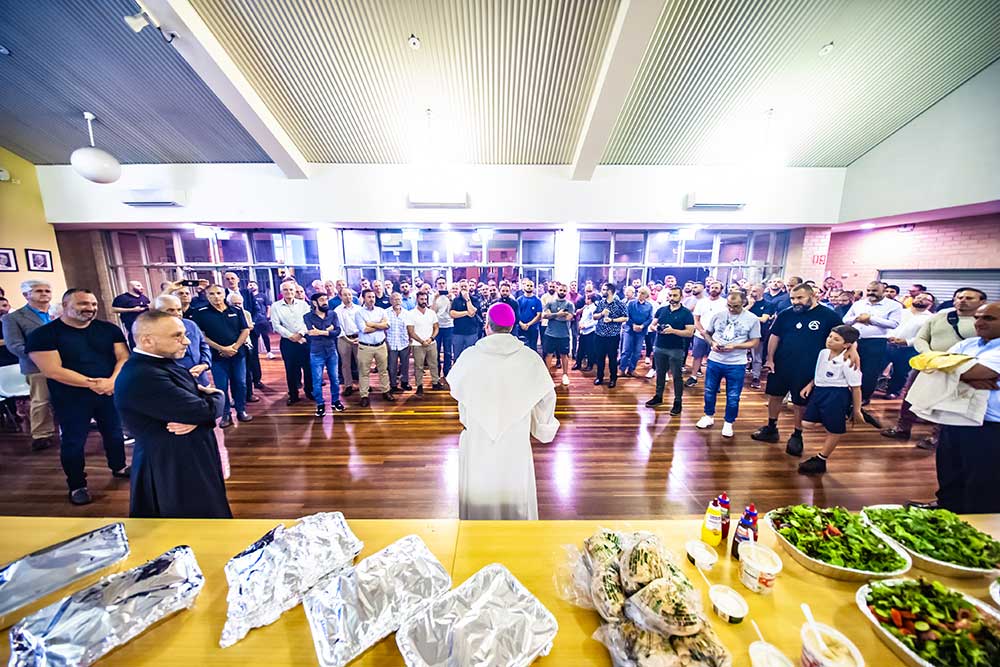
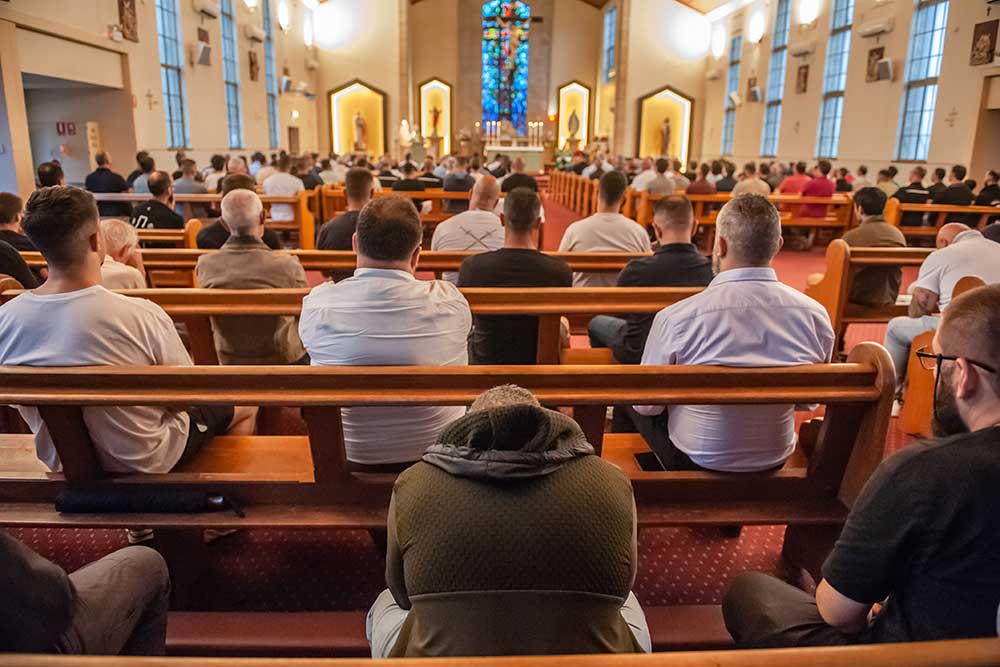
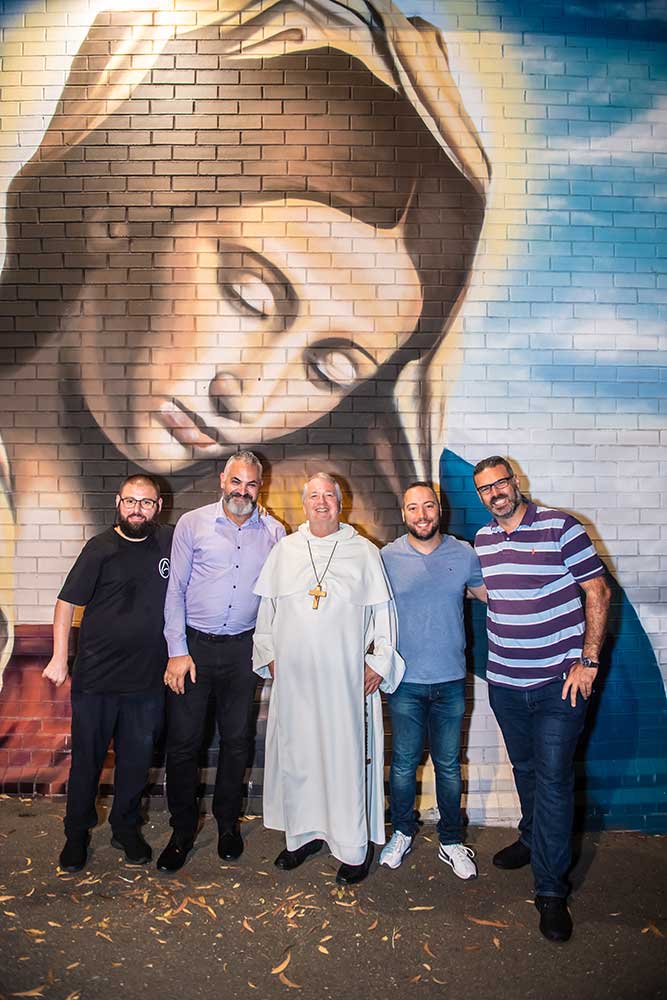
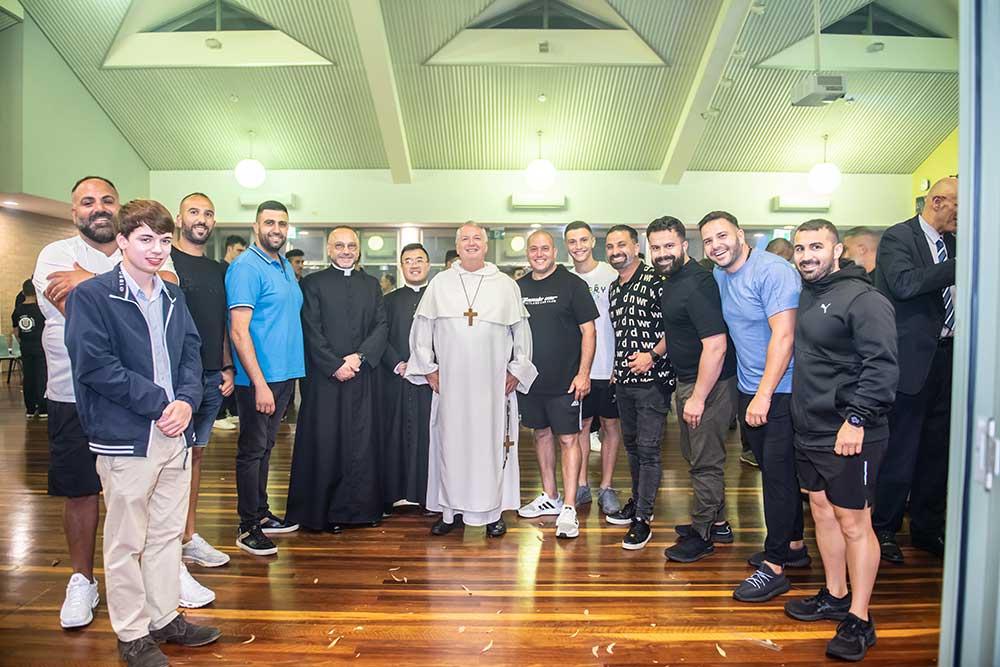
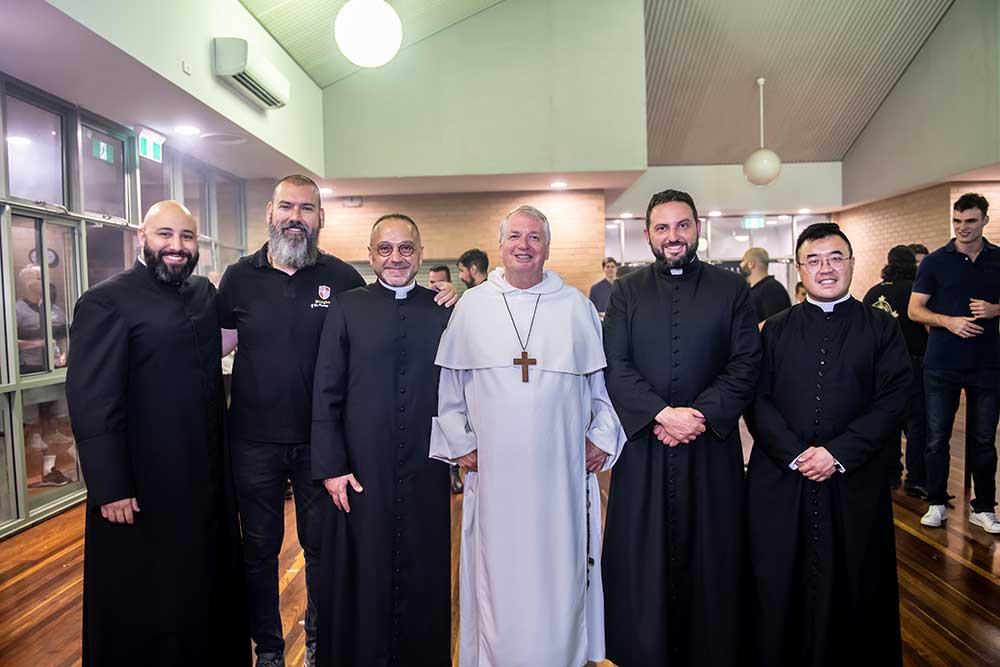
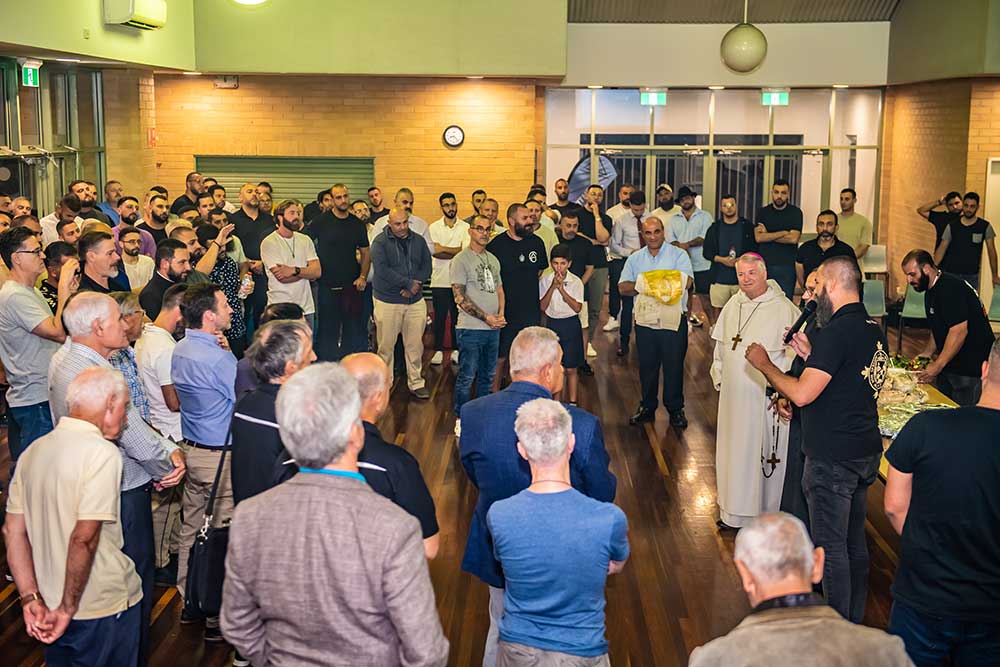
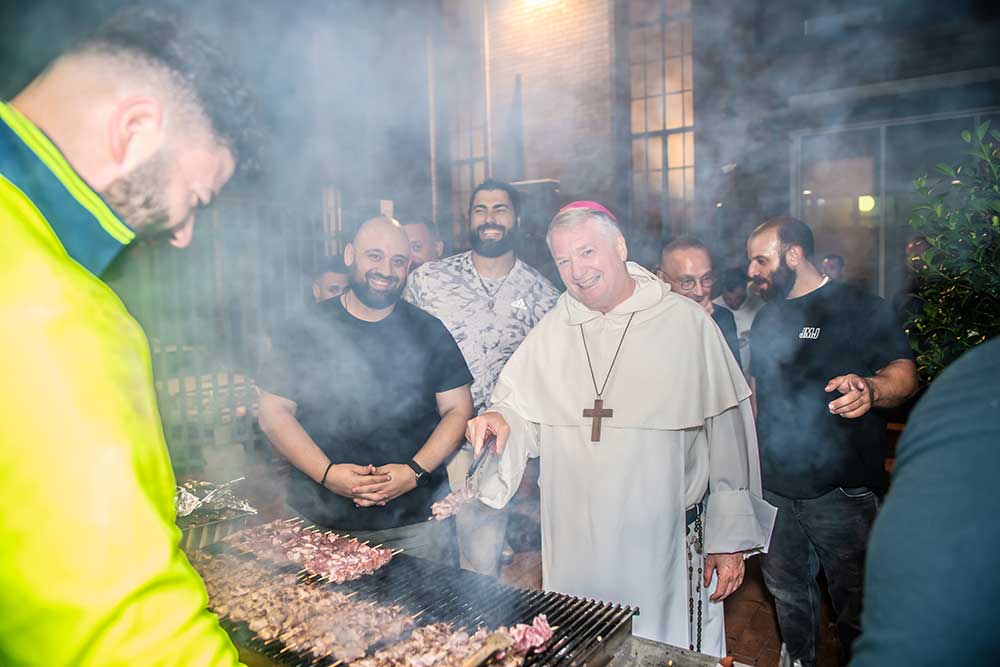
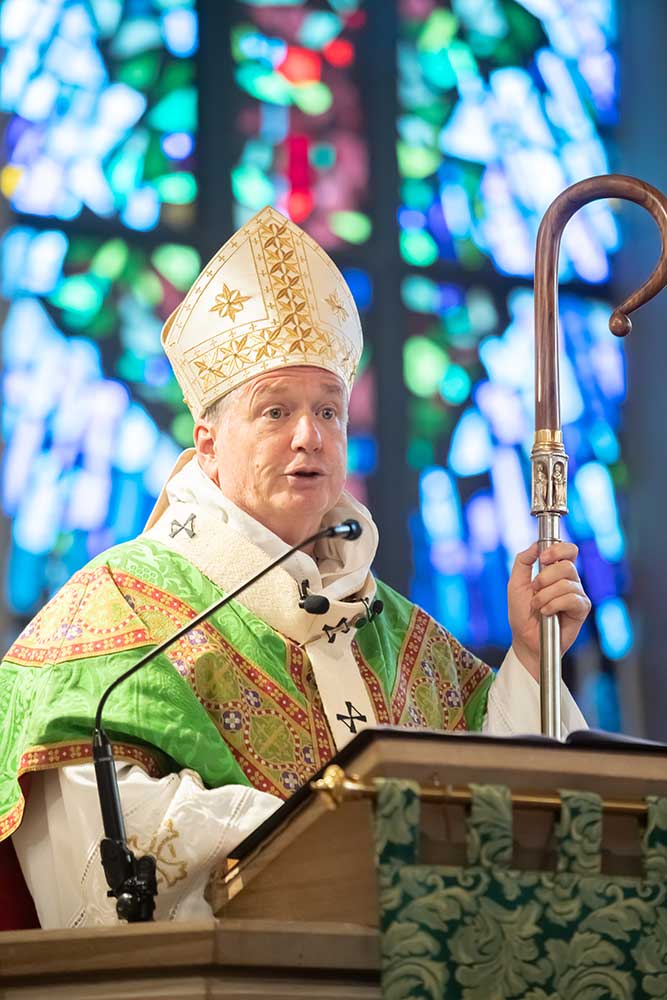
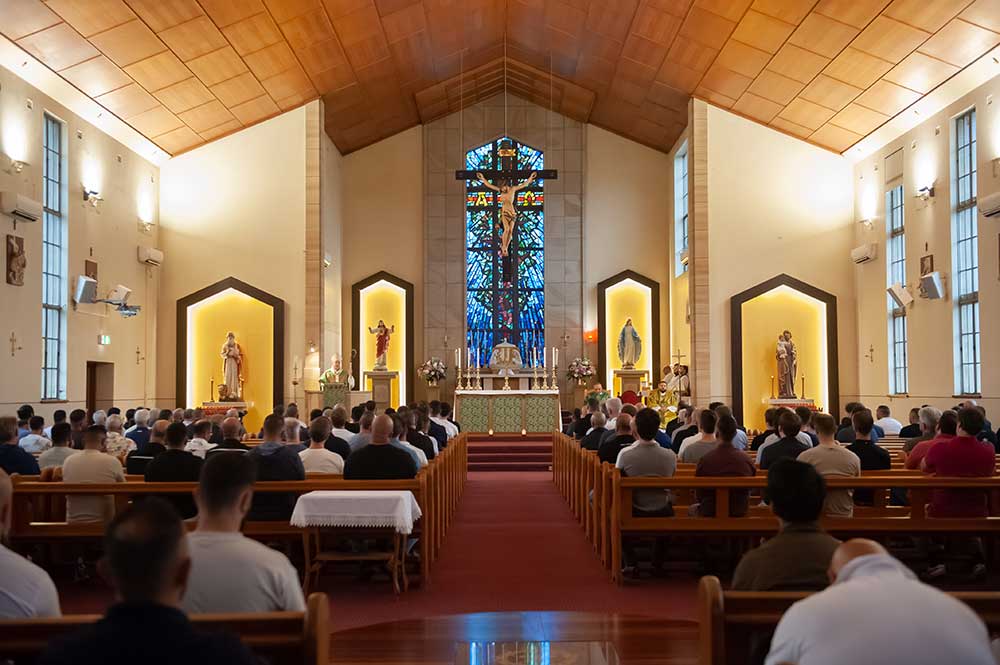
Our culture, perhaps now more than ever, needs the example of faithful men striving to live out the Gospel and the teachings of the Church in their daily lives. At a time when it’s fashionable to focus on women’s participation in the Church, especially in leadership, on the protection and engagement of children and young people, on various alienated groups, on the role of the clergy, lay men can feel on the outer or unsure of their place. To be fair, this is a society-wide problem, not just a Church problem: there seems to be community-wide confusion about the identity and responsibilities of men in our world today.
But the Church needs men and men need the Church. The Church needs Viri Dei, Men of God, baptised to share in Christ’s triple office of shepherd-priest, teacher-prophet and servant-king, energised by Word and sacrament to witness to truth, beauty and goodness, intentional about bringing the truth and love of Christ to their families and friendships, academies and workplaces, parishes and communities, to Punchbowl and the very ends of the earth! We need men who are ready to evangelise boldly, love compassionately, and serve faithfully.
I acknowledge concelebrating with Fr Joseph and me tonight Fathers Ibrahim, William and Lewi. To everyone present, a very warm welcome.

